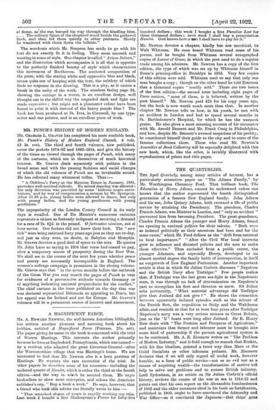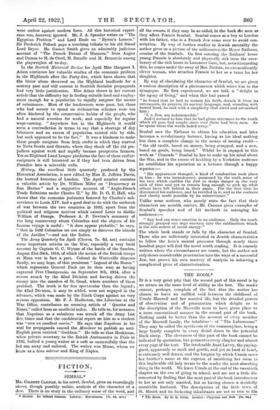Tag QUARTERLIES.
Tnu April Quarterly, among many articles of interest, has a particularly attractive paper on " The Adams Family," by Mr. Worthington Chauncey Ford. That brilliant book, The Education of Henry Adams, cannot be understood unless one knows that the author represented the fourth distinguished generation of a famous New England family. John Adams and his son, John Quincy Adams, both crowned a life of public service by attaining the Presidency. The grandson, Charles Francis Adams, was Minister in London, and " only an accident " prevented him from becoming President. The great-grandsons, Charles Francis Adams the younger and Henry Adams, found no opening in national politics for their talents. " Both were as isolated politically as their ancestors had been and for the same cause," which Mr. Ford defines as the " drift from national to local importance." " After the Civil War local interests grew in influence and dictated policies and the men to make them effective." Thus excluded from a public career, the younger Adamses, and especially Henry, developed to an almost morbid degree the family habit of introspection, in itself an outgrowth of New England Puritanism. Another important article is that in which Sir Julian Corbett discusses " Napoleon and the British Navy after Trafalgar." Few people realize that, if Trafalgar was the last great sea-fight in the Napoleonic wars, it was through no lack of determination on Napoleon's part to strengthen his fleet and threaten us anew. Sir Julian asks pertinently, " What material advantage did Trafalgar give that Jutland did not give ? " He shows the connexion between apparently isolated episodes such as the seizure of the Danish fleet, the expedition to- Sicily and the Walcheren affair, and reminds us that for at least four years after-Trafalgar Napoleon's navy was a very serious menace to Great Britain, just as the ` U ' boats were long after Jutland. Sir R. Henry Rew deals with " The Position and Prospects of Agriculture," and maintains that farmer and labourer must be brought into some kind of partnership if the present agricultural system is to be continued. Mr. A. E. Zimmern writes on " The Problem of Modern Industry," and is bold enough to remark that Ruskin, with his fine idealism, pointed a truer way than Marx or the Guild Socialists or other inhuman pedants. Mr. Zimmem declares- that if we will only regard all useful work, however humble, as a form of public service—not as an evil nor as a means of acquiring wealth—the transformation of motive will help to solve our problems and to restore British industry. Lord Sydenham, in an article on Sir Julian Corbett's official history, reviews the course of the war at sea in 1914-15 and points out that his own report on the Alexandria bombardment- of 1882 and the-other instances cited in his book on fortification; published in 1900, ought to have, convinced the Admiralty and . War Office—as it convinced the Japanese—that ships' guns
were useless against modem forts. All this historical experi- ence was, however, ignored. Mr. J. A. Spender writes on " The Egyptian Problem " and Lord Ernle on " Byron's Letters."
Sir Frederick Pollock pays a to. thing- tribute to his old friend Lord Bryce. Mr. Garnet Smith gives an admirably judicious account of " The French Drama of Manners," from Augier and Dumas to M. de Curd, M. Bataille and M. Bernstein among the playwrights of to-day.
In the Scottish Historical Review for April Miss Margaret L Adam continues her valuable studies of the economic problem in the Highlands after the Forty-five, which have shown that the bitter abuse showered on the Highland landlords for a century past and still current in Scottish Socialist propaganda had very little justification. Miss Adam shows in her current article that the difficulty lay in finding suitable land and employ- ment enough for a population to rapidly outgrow the means of subsistence. Most of the landowners were poor, but those who had money to spend on reclamation schemes were too often hindered by the conservative habits of the people, who had a natural aversion for work, and especially for regular wage-earning. " Anywhere but in the Highlands it would seem a contradiction in terms to say that a shortage of day labourers and an excess of population existed side by side, but such appeared to be the fact." It was a kindness to make these people emigrate from little crofts in which they starved to Nova Scotia and Ontario, where they shook off the old pre- judices against work and rapidly became prosperous farmers. Yet on Highland Land League platforms the fate of these crofter- emigrants is still lamented as if they had been driven from Paradise into a miserable exile.
History, the excellent little quarterly produced by the Historical Association, is now edited by Miss E. Jeffries Davis, the learned historian of London. The April number contains a valuable article by Dr. William Miller on " Democracy at San Marino " and a suggestive account of " Anglo-French Trade Relations under Charles U." by Mr. D. G. E. Hall, who shows that the economic jealousies fostered by Charles's sub- servience to Louis XIV. had a good deal to do with the outbreak of war between the two countries in 1689, apart from the political and religious motives which caused Louis to dislike William of Orange. Professor A. P. Newton's summary of the long controversy about Columbus and the objects of his famous voyage is useful : " it does appear probable," he says, " that in 1492 Columbus set out simply to discover the islands of the Antilles "—and not the Indies.
The Army Quarterly for April (Clowes, 7s. 6d. net) contains some important articles on the War, especially a very lucid account by Captain G. C. Wynne of the battle of the Sambre, August 21st-24th, 1914. of which the action of the British troops at Mons was in fact a part. Colonel de Watteville disposes finally, we may hope, of that persistent " Legend of the Marne " which represents General Foch (as he then was) as having captured Fare Champenoise on September 9th, 1914, after a severe attack by the 42nd Division and having driven the enemy into the marshes of St. Gond, where numbers of them perished. The truth is far less spectacular than the legend ; the 42nd Division, it may be added, were not engaged in the advance, which was made by the Ninth Corps against no very serious opposition. Mr. F. J. Hudleston, the Librarian at the War Office, contributes an amusing article of Queries and Notes," culled from an unofficial index. He tells us, for instance, that Napoleon as a subaltern was struck off the Army List five times and that the confidential report on him as a student was "sera un excellent marin." He says that Napoleon in his zeal fora propaganda caused the Moniteur to publish an anti- English poem entitled " Goddam." He tells us that Huskiason, when private secretary to the British Ambassador in Paris in 1792, bullied a young waiter at a café so unmercifully that the lad ran away and enlisted. The waiter was Murat, whom we know as a beau sabreur and King of Naples.



































 Previous page
Previous page